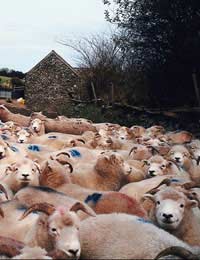Recycling Sewage: Heat from Dung

The best example of using heat from dung is witnessing nomads of the Gobi Desert and Mongolia collecting dried dung from their sheep and camels. This is then stored outside their tent or ger, and further dried in the often harsh wind, and then used for fuel in the continually-burning stove in the centre of the tent that is used for both heating and cooking.
The advantages of this simple retrieval method is that providing you maintain enough animals – which involves regularly moving them to fertile pasture, hence the term agricultural or pastoral nomads, there will always be enough fuel. This is a wonderful example of the simplicity and cyclical nature of ecology, and living in close connection to the environment. This is a way of living that is dependent upon recycling, and where nothing goes to waste.
Extracting Energy from Waste: Reality or Fantasy?
Given that sewage is produced in such vast quantities, and uses so much valuable water to remove and treat it, wouldn't it be beneficial if, in a similar way to the nomad's use of animal waste products out on the steppe, then for the western, Industrialized world this waste could also become some kind of a resource too, or at least much less of an environmental burden?On the Farm: Using Animal Waste
There are some small-scale available systems that convert sewage into heat, although these are generally farm-based operations that work with animal waste, and re-use energy from the sewage as electricity to power the farm systems, with heat being a by-product. Methane is easily extractable as a gas from animal waste, but it is not easy to convert and store this for commercial purposes.These systems tend to be micro-systems, generating enough power to run itself, and not enough to share outside itself, i.e. not able to contribute to the national power grid.
However, these systems are still developing, and there will be further innovations soon.
On the Land: Recycling Biosolids
Although it is not converting sewage to heat, there has been much political activity, fueled by green pressure groups, on the use of sewage sludge, or biosolids, for agricultural use. This activity has been common practice for many generations in Europe, but recently the UK Government and the European Union has established the Best Practicable Environmental Option (BPEO) which supports farmers in their use of applying sewage sludge to land as a natural source of fertilizer. In the UK over 1 million tonnes of sludge (as dry solids) is produced every year, and approximately 55% of this is recycled to agricultural use. Strict controls of the microbiological quality of the sludge apply, particularly when it is applied to land used to grow food crops. The Government asserts that “robust safeguards” are in place that support this practice, and protect all involved, from the farmer through to the consumer.The Future: Recycling all our Waste?
It would be wonderful to think that all of human society could find ways to recycle or reuse somehow ALL the waste products that we produce, including sewage and dung. The example of the nomad’s use of cattle dung is an inspiring one to witness and keep in mind, but the reality for the rest of us is far from that. Farm waste can be a source of power, and then heat and light, and some of our sewage output can be reused on the land. But we as a society are still far off from being guilt-free in our production of waste and use of resources to deal with the waste. Now is the time to come up with solutions and move toward truly living lightly on the earth, for all our sakes.- Are Plastic Bags Always a Bad Thing?
- CSI Dustbin: The World of Forensic Waste
- Recycling, Personal Information and Identity Theft
- How To Recycle Used Gas Canisters
- China Goes Green in Recycling Effort
- Recycling PC's and Protecting Your Data
- Recycling at Christmas
- Purchasing Power
- The Anthropology of Rubbish and Recycling
- Eco-Schools
- Ways to Reduce Packaging and Household Waste
- Educating About Recycling
- Recycling Around The World
- Generating Power From Waste
- The Art of Recycling


Re: Recycling White Goods
I have my old refrigerator & dishwasher to be given away.
Re: Recycling White Goods
HI I am in need of a spider shaft for my Samsung front loader washing machine. Can anyone help me with one please I am on a disability…
Re: Recycling White Goods
I have an all drink frig and a dishwasher both domestic appliance both working need more space at home
Re: Rules Governing Use of Recycling Logo
I am so confused with recycling labels. Nothing seems standardised? Surely, it should be a case of 2 options Recycle…
Re: How to Recycle Our Office Telephones?
The Parish Council would like to donate the following phone system, if someone could come and collect it. Panasonic…
Re: How to Recycle Our Office Telephones?
We have Phones that we would like to recycle. Poly Phone models CX300 x 20 CX600 x 28 Cx700 x 2 Vvx600 x…
Re: More Environmentally Friendly to Use Glass Milk Bottles?
Why is it more expensive to wash and refill bottles for milk than using a new carton which is…
Re: More Environmentally Friendly to Use Glass Milk Bottles?
I would like to get free range milk in glass bottles, is this possible?
Re: More Environmentally Friendly to Use Glass Milk Bottles?
Do you have recycling experts to talk to? As I am creating new vegan skin care brand and the…
Re: More Environmentally Friendly to Use Glass Milk Bottles?
We have recently started having our milk delivered in glass bottles by a local dairy. At…